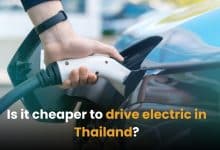Chinese EV investments in Thailand linked to zero dollar tours

Chinese Electric Vehicle (EV) makers’ investments in Thailand have sparked comparison with a notorious scam, the zero dollar tours, among some industry insiders. The scam, which came into the limelight in 2016, involved Chinese tourists being enticed with inexpensive tour packages in Thailand, only to be compelled to purchase overpriced souvenirs and services.
The parallel is being drawn because Chinese EV companies not only manufacture EVs in Thailand but also import producers of EV components to establish an EV supply chain in the country. This leaves local firms out of the loop, similar to the zero dollar tours where only Chinese tour operators and shop owners profited, said Saroge Vasuvanich, honorary vice-president of Thai Summit Group Plc.
“Chinese EV investment reminded me of zero dollar tours because the Chinese firms do not buy products from Thai companies.”
However, not all industry leaders share this sentiment. The Thai Automotive Industry Association (TAIA) believes that the arrival of Chinese producers of EV components is vital for the nascent industry since local auto parts makers lack knowledge of electric mobility technology, said Suwat Supakandechakul, TAIA President.
“We have to accept that EV technology is new in Thailand and the government needs to draw foreign investors, mostly Chinese, specialising in the technology to jointly build an EV infrastructure.”
In the long run, the Federation of Thai Industries (FTI)’s Automotive Industry Club expects local firms to see clearer business opportunities as Chinese EV makers may consider outsourcing, similar to traditional automakers from Japan, Europe and the US.
Zero dollar tour
Thailand’s own EV maker, Horizon Plus, a joint venture between PTT Plc’s wholly-owned Arun Plus and Taiwan-based Hon Hai Precision Industry Co, concurs with this outlook, said Buranin Rattanasombat, PTT’s chief new business and infrastructure officer and chairman of Horizon Plus.
“We are in the early stages of the EV market, so it is not easy to analyse whether the zero dollar tour phenomenon will happen in this segment.”
Meanwhile, Energy Absolute Plc (EA), a pioneer in the Thai EV industry, views the entry of Chinese EV component makers as normal business competition, said Amorn Sapthaweekul, deputy chief executive of EA.
“EV assemblers need to partner with reliable parts suppliers and manufacturers who can offer quality products at competitive prices, as well as good after-sales services.”
The shift towards EVs has prompted both the state and private sectors to aid local auto parts makers in accessing the EV supply chain. Government agencies, including the Board of Investment (BoI), and the FTI are encouraging car companies to use domestically manufactured EV components and transfer technology know-how to auto parts makers.
The Board of Investment of Thailand (BoI) has provided tax incentives to 103 projects worth 77.1 billion baht in EV-related segments. The projects encompass EV assembly, battery manufacturing and EV charging stations.
On the other hand, the FTI is joining forces with EV makers, including Chinese companies, to assist local auto parts makers with EV technology transfer under a project overseen by the Cluster of FTI Future Mobility-ONE, said Vithavat Thongves, secretary-general of the FTI’s Automotive Industry Club.
“We are working with various brands to equip auto parts manufacturers, as well as students with EV know-how.”
Despite the challenges, the industry remains optimistic about the growth of the EV sector in Thailand. The country has the potential to produce up to 2 million cars a year, making it a promising hub for EV manufacturing.
Latest Thailand News
Follow The Thaiger on Google News:


























